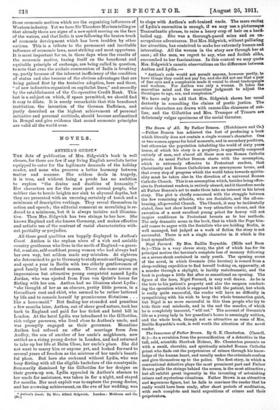NOVELS.
ANTHEA'S GUEST.* THE date of publication of Mrs. Sidgwick's book is well chosen, for there are few if any living English novelists better equipped to cater for the legitimate demands of the holiday reader, and none who preserve a better harmony between matter and manner. She seldom deals in tragedy, it is true, and without being a prude has no ambition to explore "the drains and dustbins of humanity." Her characters are for the most part normal people, who neither rise to heroic heights nor sink to abysmal depths, but they are presented with an unerring certainty of touch and a minimum of descriptive verbiage. They reveal themselves in action and speech; the editorial comment or moralizing is re- duced to a minimum, but it is always incisive and illumina- tive. Then Mrs. Sidgwick has two strings to her bow. She knows England and she knows Germany, and makes effective and artistic use of the contrast of racial characteristics with- out partiality or prejudice.
All these good qualities are happily displayed in Anthea's Guest. Anthea is the orphan niece of a rich and amiable country gentleman who lives in the north of England—a grace- ful, resolute, self-confident young woman who had always had her own way, but seldom made any mistakes. At eighteen she determined to go to Germany to study music andlanguages, and spent a year in Berlin with two elderly gentlewomen of good family but reduced means. There she came across an impecunious but attractive young compatriot named Lydia Jordan, who was ejected from Frau von Quint's house for flirting with her son. Anthea had no illusions about Lydia : "she thought of her as an obscure, pretty little person, in a threadbare coat and skirt, who seemed to be rather battered by life and to console herself by promiscuous flirtations . . . like a housemaid." But finding her stranded and penniless a few months later, Anthea, out of sheer good nature, took her back to England and paid for her ticket and hotel bill in London. At the hotel Lydia was introduced to the Gilbottles, rich vulgar parvenus, who lived close to Anthea's uncle, and was promptly engaged as their governess. Meantime Anthea had refused an offer of marriage from Jem Audley, the son of another of her uncle's neighbours, now settled as a rising young doctor in London, and had returned to take up her life at Helm Close, her uncle's place. She did not want to marry him or anyone yet, and looked forward to several years of freedom as the mistress of her uncle's beauti- ful place. But here she reckoned without Lydia, who was busy flirting with all the eligible bachelors of the countryside. Summarily dismissed by the Gilbottles for her designs on their grown-up son, Lydia appealed in Anthea's absence to her uncle for assistance, was taken in for a night, and stayed for months. Her next exploit was to capture the young doctor, and her crowning achievement, on the eve of her wedding, was • Anthea's Guest. By bur. Alfred Bidgwick. London : Methuen and Co. Dz.]
to elope with Anthea's soft-brained uncle. The mere recital of Lydia's enormities is enough, if we may use a picturesque Transatlantic phrase, to raise a heavy crop of hair on a hard- boiled egg. She was a thorough-paced minx and an un- scrupulous adventuress. But Mrs. Sidgwick, without palliating her atrocities, has contrived to make her extremely human and interesting. All the women in the story saw through her at once ; all the men, we regret to say, wise and foolish alike, succumbed to her fascinations. In this context we may quote Mrs. Sidgwick's caustic observations on the difference between Anthea and Lydia:-
"Anthea's code would not permit anyone, however pretty, to have things they could not pay for, and she did not see that a pair of fine eyes and a complexion made it venial to cheat tradespeople and workers. For Anthea was only a woman. It takes the masculine mind and the masculine judgment to adjust the Decalogue to age, sex, and complexion."
We have only to add that Mrs. Sidgwick shows her usual dexterity in consulting the claims of poetic justice. The
minor characters are drawn with cameo-like clearness of out- line, and the Gilbottles and Mrs. Trumper of Timaru are deliciously vulgar specimens of the social thruster.


































 Previous page
Previous page